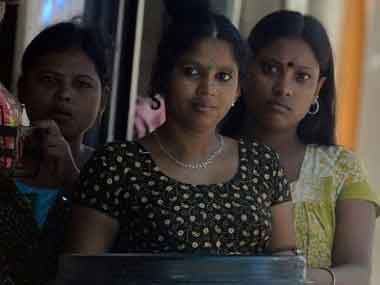Marking a landmark-shift in the country’s moralistic view of sex work, the Supreme Court of India wanted to see if sex workers can be empowered so that they can continue their lives with dignity. Human rights activists and the UN will tell you that it is the way to go and that it is the optimum model that has worked anywhere in the world. But the UPA government, loaded with top-notch lawyers, is outright regressive in its stand. The government told the apex court that creating conducive conditions for sex workers “implies recognising sex work as a legal occupation. This implies legalisation of prostitution, which goes against the law of the land.” It also told the court that the move will perpetuate trafficking. Is it true? Not really. Evidence shows otherwise. [caption id=“attachment_282495” align=“alignleft” width=“380” caption=“The UPA government, loaded with top-notch lawyers, is outright regressive in its stand. Punit Paranjpe/AFP”]  [/caption] Going by the government’s argument, India should have curbed sex work as well as trafficking substantially through its existing policy. Instead, according to Human Rights Watch, the country has about 20 million women in sex work. Mumbai, with 200,000 sex workers, is the sex work capital of Asia. And the number of sex workers has doubled in the last ten years. Various studies indicate that 50-60 percent of sex workers at many locations are HIV positive. India is also the hub of sex trafficking in south Asia. For instance, missing girls is a phenomenon in parts of Andhra Pradesh. The sex industry in India also attracts girls from Nepal and Bangladesh. Did the existing Indian approach help in addressing the ever-worsening situation? Not at all. In the face of such facts, the government is shamelessly blocking a progressive step of the apex court and civil society. Nobody seems to know why. The government’s stand is more moral than legal or scientific, and is not backed by any rational policy. It betrays a colonial mindset, and appeasement of majoritarian public morality that refuse to acknowledge human rights as an overarching principle of public life. And seemingly, it has least regard for Article 21 of the Indian constitution and the right to life with dignity that the court had cited for its intervention. A human rights based model, in which sex workers have safe and conducive working conditions, as sought by a supreme court panel, is in fact the only model that worked anywhere in the world — be it in Amsterdam, New South Wales or Bangkok. In Bangkok sex work is not legal, but the government doesn’t make a big fuss about that. Instead, it ensures that the sex workers have safe working conditions including 100 percent condom compliance, and that they are not victims of harassment of state institutions. A recent consultation on sex work by UNFPA calls for these: universal human rights, removal of criminal laws, access to justice to prevent rights violations and acceptance of sex work as work. It also urges elimination of rights violation by all actors including the state and safe working spaces for sex workers. And the government of India looks exactly in the opposite direction and files an affidavit in the Supreme Court that conflicts with all these. UN studies also show that a rights-based approach is also essential for reducing HIV transmission among sex workers. Despite years of expensive interventions, the HIV-prevalence among sex workers in India is one of the highest in the world. Although the health department, that spent several millions of borrowed dollars on AIDS work, tacitly supports the human rights approach; the rest of the arms of the central and state governments nullify them. The supreme court affidavit is an example of this contradiction as well. In 2011, a supreme court bench comprising Justices Markandey Katju and Gyan Sudha Misra, made a landmark move when it constituted an expert panel to go into “aspects of prevention of trafficking and rehabilitation of sex workers who wish to leave the work, and creation of conditions conducive to others who wish to continue as sex workers with dignity.” The SC’s two pronged approach was sensible: help rehabilitate sex workers who want to get out of their profession; and support those who wish to continue in sex work to do it with dignity. The court has also asked for a survey of sex workers and directed the state and central governments to cooperate with the panel. Globally, opinion is divided on sex work. While supporters of human rights-based approaches, including the UN, oppose criminalisation of sex workers; others mainly led by the Bush-era US government are against sex work since it purportedly fosters trafficking. The US policy sometimes conflated sex work, migration and trafficking. This polarisation, most often vicious, is seen in countries such as India, Nepal and Bangladesh as well. One group is bent on crackdowns to prevent trafficking, while the other group opposes it in the name of human rights. India, in fact, has home-grown examples to show that the empowerment model works better than criminalisation. For instance, Durban Mahila Samanwaya Committee (DMSC), a collective of sex workers in Kolkata, showed how self regulation is better. The winds of change on India’s prudish, majoritarian stand on sexuality had begun in 2009 when the Delhi High Court decriminalised consensual gay sex. Although the government of India spoke in contradictory voices on the issue before the court, finally things fell in place well. Now it is the turn of legal reforms on sex work. Perhaps what we see now is the beginning of a final argument on sex work and the dirty world of criminals, pimps, drugs, minors and diseases.
The government told the Supreme Court that creating conducive conditions for sex workers “implies recognising sex work as a legal occupation. This implies legalisation of prostitution, which goes against the law of the land.”
Advertisement
End of Article


)
)
)
)
)
)
)
)
)



